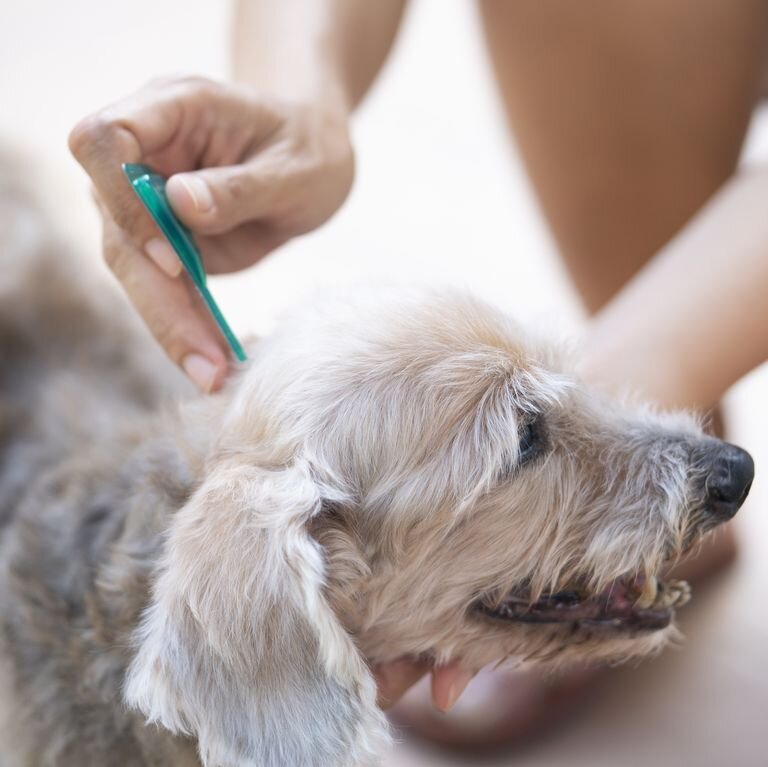Expert-Approved DIY Flea Remedies To Get Them Off Your Dog
Woman’s Day
Olivia Muenter // July 24, 2020

If you have a pet, then odds are you’ve thought (whether you wanted to or not) about fleas. This is specially true if you’re a dog owner who loves to spend time outside with their favorite pup. From trying to help your dog avoid getting fleas to figuring out what to do when you notice your four-legged friend itching more than usual, worrying about these less-than-ideal flightless insects just comes with the dog-owner territory.
Thankfully, there's a tried-and-true, DIY way to treat fleas at home, should a situation call for it. Woman's Day spoke to veterinarians and pet experts to learn more about how dogs get fleas, how to prevent your canine from getting fleas, and how you can treat these buggers with at-home, natural remedies that any dog-owner can lean on when there's a flea infestation afoot.
How do dogs get fleas?
“Dogs can get fleas from other animals," Kurt Venator, DVM, PhD, Chief Veterinary Officer at Purina, tells Woman's Day. "While they may not come in direct contact with other animals, they can pick fleas up from outdoor areas that other animals have come into contact with. In fact, many animals can seed your backyard with fleas, such as skunks, opossums, raccoons, squirrels, mice, and other wildlife.
The best type of flea treatment is preventing your dog from getting them in the first place.
CHUTIMA CHAOCHAIYAGETTY IMAGES
Can a dog owner keep their dog from getting fleas in the first place?
Venator says that a common and effective way to get rid of fleas is to make sure that you never have to worry about them in the first place. The use of a flea preventative, he points out, is a great way to nip any potential problem in the bud. These proactive measures are specially important if your dog spends a good amount of time outdoors and/or swimming.
Some highly-recommended, preventative flea treatments include FRONTLINE Plus for dogs (Target, $41.99), Seresto (Chewy, $45.99), and TevraPet Activate II (Amazon.com, $24.98).
How can a dog owner treat fleas?
If you don’t use a preventative medication or collar, and your dog does end up with fleas, it’s important that you treat them right away, Dr. Jennifer Freeman, PetSmart’s resident veterinarian, tells Woman's Day.
“Bathe your dog using a specially formulated flea and tick shampoo that is designed to kill parasites and carefully remove ticks trying to ensure to get the entire parasite,” Freeman says, explaining that a groomer or vet can also do this for you.
Are there any natural, DIY at-home flea remedies?
If you’re looking for a natural remedy to keep fleas away, instead of a traditional, over-the-counter preventative, there are DIY recipes out there. Heather Crowe, founder of dog adoption/fostering charity HIT Living Foundation, told Woman's Day that trying a “DIY Flea Collar,” which combines 1/2 tsp. of rubbing alcohol, and one drop of garlic and various essential oils to keep fleas away.
Whether you use preventative treatments or not, it’s important to treat your dog’s fleas as soon as possible.
ZIVICA KERKEZGETTY IMAGES
When it comes to treating existent fleas, though, most vets will suggest seeing a professional. “Most veterinarians do not recommend home remedies for fleas and tick,” Freeman says.
If you are looking for a solution that’s free of any toxic ingredients, though, Stephanie Boone, CEO and Founder of Wondercide, tells Woman's Day that her company’s product is a great option.
“The best at-home flea treatments empower you to get rid of pesky fleas fast and keep them away with gentle ingredients that are as safe for your furry loved ones as they are for the rest of the family,” Boone says. “With Wondercide you don’t have to use poisons to protect your Pack from fleas, ticks, or mosquitoes.”
Instead, Wondercide uses plant-based ingredients to fend off fleas, Boone explains.
Do dog owners have to visit a veterinarian to treat fleas?
No matter what flea prevention system you intend to use, it’s important to remember that preventing and treating fleas can often start at home.
“It’s important to recognize that managing flea issues with our pets is not only dependent on preventative medication, but also rigorous household cleaning,” Venator says. “This means keeping humidity within the home low, vacuuming at least weekly (including furniture, under the couch cushions, and even under the bed), frequent pet bed washing, and washing your own bedding in hot water at least once a week as well. And don’t forget to throw away any vacuum bags after cleaning, as you don’t want fleas developing and crawling out.”
Want more pet care tips? You're in luck! Subscribe to Woman's Day today and get 73% off your first 12 issues. And while you’re at it, sign up for our FREE newsletter for even more of the Woman's Day content you want.


